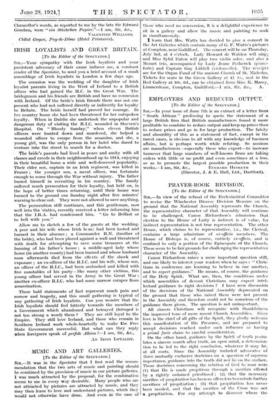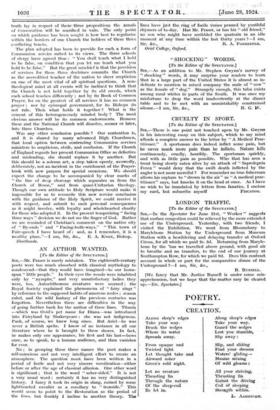PRAYER-BOOK REVISION. [To the Editor of the SPECTATOR.] Snt,—In view
of the refusal of the Ecclesiastical Committee to revise the Winchester Diocese Division Measure on the ground that the National Assembly represents the Church, the representative character of that Assembly will continue to be challenged. Canon Richardson's admission that election to the House of Laity is indirect is of value, for indirect representation is not true representation. The other House, which claims to be representative, i.e., the Clerical, contains a large admixture of ex-ojficio members. The House of Bishops is, of course, entirely ex-officio, and is confined to only a portion of the Episcopate of the Church. These seem to be fair grounds for challenging the representative character of the Assembly.
Canon Richardson raises a more important question Still, and one likely to interest your readers when he- says : " Chris- tians in conference are learning to believe in one another, and to expect guidance." He means, of course, the guidance of the Holy Spirit. What are, then, the conditions under which assemblies of devout Christians may expect intel- lectual guidance to right decisions ? I have seen discuss'io'n of the decisions of the National Assembly deprecated do the ground that those who raised them were not present in the Assembly and therefore could not he conscious of the guidance there given. The question is not unimportant. • All sincere Christians will recognize with thankfulness the improved tone of more recent Church Assemblies. Since love is the chief of all gifts of the Spirit, they gladly welcome this manifestation of His Presence, and • are prepared to accept decisions reached under such influence as having a prima fade claim to careful consideration.
On the other hand, guidance by the Spirit of truth postu- lates a sincere search after truth, an open mind, a cletermiwi- Lion to be led to the right conclusion, whatever it•may be, at all costs. Since the Assembly included advocates- of three mutually exclusive doctrines on a question of supreme importance, guidance into the truth did not lie on the surfadc. Those doctrines concerning the relation of God to man were. (1) that He is made propitious through a sacrifice offered by a rightly ordained priesthood ; (2) that the necessary sacrifice of propitiation has been so offered as to exclude further sacrifices of propitiation ; (8) that propitiation has • never been needed, and that the sacrifice of the Cross was • ndt a propitiation. For any attempt to discover where the
truth lay in respect of these three propositions the annals of Convocation will be searched in vain. The only point on which guidance has been sought is how best to regularize within the borders of one Church the holders of these three conflicting tenets.
The plan adopted has been to provide for each a form of Communion service suited to its views. The three schools of clergy have agreed thus : " You shall teach what I hold to be false, on condition that you let me teach what you hold to be false." But the great mischief is that the provision of services for these three doctrines commits the Church as the- accreditied teacher of the nation to sheer scepticism on one of the most vital of all spiritual questions. A non- theological mind at all events will be inclined to think that the Church is not held together by its old creeds, which each school teaches differently ; not • by its Book of Common Prayer, for on the greatest of all services it has no common prayer ; nor by episcopal government, for its Bishops do not rule. Then what holds it together ? What is " the cement of this heterogeneously minded body ? The most obvious answer will be its common endowments. Remove these and the National Church will dissolve, sooner or later, into three Churches.
Was any other conclusion possible ? Our contention is, and it is shared by many advanced High Churchmen, that local option between contending Communion services ministers to scepticism, strife, and confusion. If the Church of england regards her present Communion Office as defective and misleading, she should replace it by another. But this should be a solemn act, a step taken openly, avowedly, deliberately, not an incident in the enrichment of-the Prayer- book with new prayers for special occasions. We should expect the change to be accompanied by clear marks of " the line of deep cleavage which separates us from the Church of Rome," and from quasi-Unitarian theology. Though our own attitude to Holy Scripture would make it impossible for us to reconcile this new service - conclusion with the guidance of the Holy Spirit, we could receive it with respect, and submit to such personal consequences as it might involve, with loyalty and wholehearted charity for those who adopted it. In the present temporizing " facing three ways " decision we do not see the finger of God. Rather we are reminded of Christiants comment on the native city of " By-ends " and " Facing-both-ways." " This town of Fair-speech I have heard of : and, as I remember, it is a wealthy place."—I am, Sir, &c., E. A. KNox, Bishop.
Shortlands.















































 Previous page
Previous page